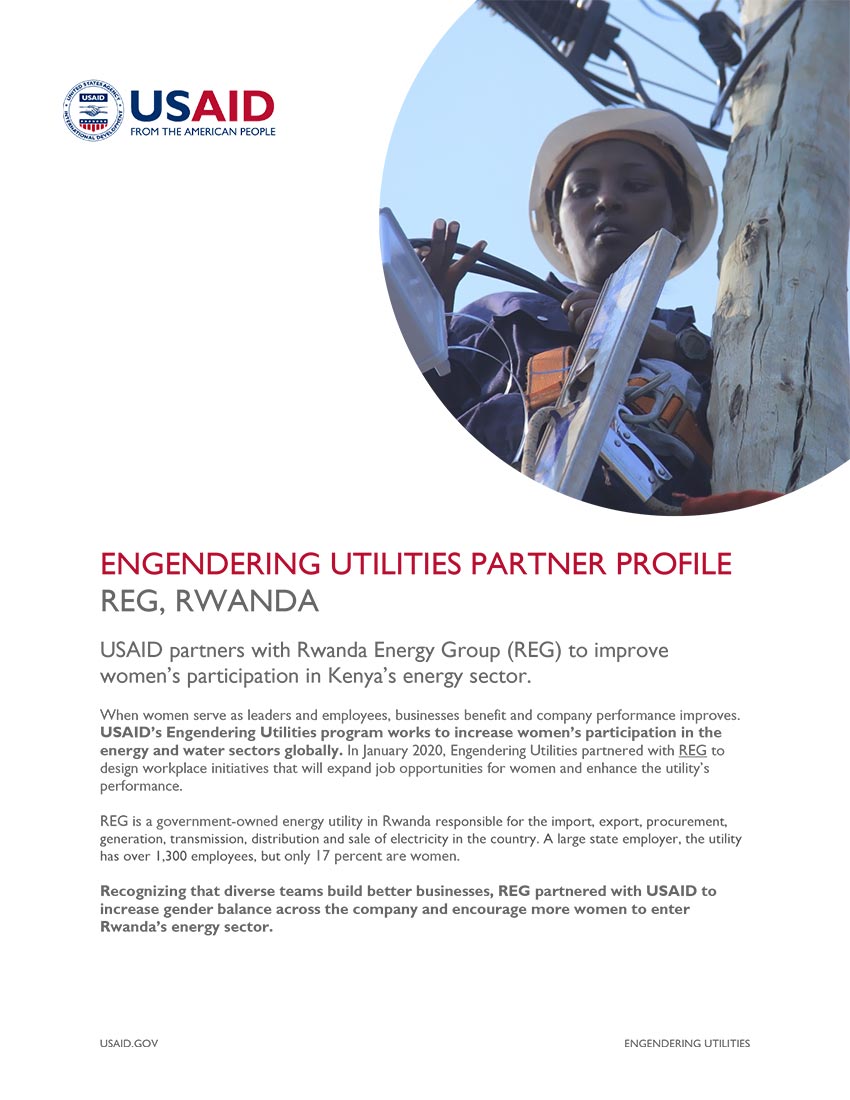- Energy Home
- How We Work
- Programs & Initiatives
- Smart Utilities
- Asia EDGE
- Auction Design Support to Colombia
- Energy Auctions for Kazakhstan’s Green Economy
- Energy Efficiency for Development
- Engendering Utilities
- About
- Business Case
- Approach
- Partners
- OSHEE, Albania
- SONABEL, Burkina Faso
- EDESUR, Dominican Republic
- DELSUR, El Salvador
- EEU, Ethiopia
- Energo-Pro, Georgia
- GRIDCo, Ghana
- BRPL, India
- TPDDL, India
- EDCO, Jordan
- IDECO, Jordan
- Miyahuna, Jordan
- KenGen, Kenya
- Kenya Power
- KOSTT, Kosovo
- LEC, Lesotho
- LEC, Liberia
- EGENCO, Malawi
- EDM, Mozambique
- EKEDC, Nigeria
- IBEDC, Nigeria
- ISWSC, Nigeria
- EVN, North Macedonia
- LASURECO, Philippines
- ZCWD, Philippines
- REG, Rwanda
- OFOR, Senegal
- Senelec, Senegal
- EVN, Vietnam
- Resources
- Stories
- Institutional Framework for Auctions in Mexico
- Powering Agriculture
- The USAID-NREL Partnership
- Scaling Up Renewable Energy
- EmPOWERing Women and Girls
- Competitive Energy Procurement
- Toolkits
- Monitoring & Evaluation
- Resources
- Stories
Speeches Shim
Engendering Utilities Partner Profile
REG is a state-owned electric utility that imports, exports, generates and distributes electricity in Rwanda. The utility has over 1,300 employees, of which 17 percent are women.
Rwanda’s energy sector is growing rapidly, and Engendering Utilities’ work with REG will ensure women can capitalize on increased investment in Rwanda’s energy sector as the industry and labor force expands. In 1995 less than one percent of the population had access to electricity. Today, 85 percent of the urban population and 24 percent of the rural population have power. Twenty years ago Rwanda relied almost entirely on hydropower, but drought and poor maintenance of dams led to drastic electricity shortages between 2000 and 2007. The government pursued strategies to diversify the country’s energy sources, and today Rwanda generates power from thermal, hydroelectric, and solar, and nearly 90 percent of Rwanda’s energy comes from renewable sources. Despite this, estimates suggest that Rwanda is producing less than ten percent of its electricity potential. The Government of Rwanda has set targets to increase power generation and achieve universal access to electricity by 2024.
A complex web of contributing factors prevents women in Rwanda from joining the formal workforce, particularly the male-dominated energy sector. Over 84 percent of women and 83 percent of men participate in the labor force, and Rwanda has the highest number of female legislative representation in the world, with 60 percent of parliament seats held by women. Despite this progress, women are more likely to work in agriculture, while men are more likely to work in more technical sectors—including water, energy, and infrastructure. Engendering Utilities is supporting REG to consider and respond to factors that reduce women’s workforce participation in the energy sector by building inclusive policies and practices that benefit men, women, and businesses.
USAID is supporting REG in its goal of increasing gender equality across the company’s business practices by providing change management coaching and leadership training, conducting a baseline assessment to identify gaps and opportunities for gender equality, and developing a strategic plan with REG to facilitate the company’s gender equality goals. USAID will support and accelerate gender equality initiatives already underway at REG as part of the broader strategic action plan, including:
- Gender Action Plan, Steering Committee, and Advisor to increase gender equality across business practices, improve corporate culture, and provide leadership opportunities for women.
- Creating Gender Equitable Policies, including a gender policy, sexual harassment policy, and gender equitable HR policies.
- Connecting Women to the Grid: REG has initiated a community service program to connect female-headed households to the grid at no cost to the homeowner. Many of the RED technicians who connect the households are women, showing both REG employees and members of the community that women can be effective change agents in the energy sector.


Comment
Make a general inquiry or suggest an improvement.